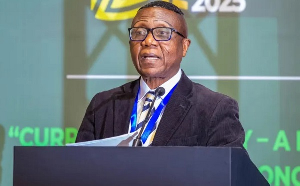Emmanuel Sarpong Owusu-Ansah (Black Power)
Ms Superstition (whose name is explained as the conceptions that are in contravention of scientific and logical knowledge, especially the unreasonable belief in cults, juju or charms, magic, and some other spiritual powers such as witches and wizards) has been identified as one of the chief enemies of Mr Progress. Disappointingly, the intervention of Dr Formal Education has almost completely failed to supress this enemy in the African society and to free the African people from her destructive claws.
Madam Superstition who began her retrogressive agenda in traditional rural communities has now succeeded in invading not only urban communities but also the African political environment, corrupting the system (the political institution) and aggravating the continent’s governmental and developmental crises.
Some political leaders now consult soothsayers or spiritualists in almost all major decisions, and work only on their advice. They do wear “magical” chains and talismans or amulets provided by their seers, which they believe give them protection, security and/or good omen. If in this day and age political leaders are following the directions of individual clairvoyants and not the populace as a whole, then democracy is terribly wounded. They persistently fail to understand that Profs Rationalism and Science, not Ms Superstition, are the true stabilizers of contemporary democracy and the key to progress.
The presence of Ms Superstition in African politics has generated a number of ills including: serious unsubstantiated allegations of one political party or figure against close rivals; political elites’ ensnarement in unreasonable fear; massive waste of time and resources, as some politicians embark on endless trips from one spiritualist or sangoma to another to seek spiritual protection and election success, and to “secure” their political positions; the illicit use of national resources by some political leaders to make expensive ritual sacrifices for their selfish ends; the refusal of political leaders to utilize expensive accommodation and transportation facilities officially provided by the state; and many more. These phenomena are what this piece refers to as ‘the politics of superstition’.
Unfortunately, Sir Media who is supposed to lead the campaign for the excommunication of Ms Superstition rather manures the ground on which the seed of the politics of superstition is sown, and/or blossoms. In other words, Sir Media provides a platform conducive to the propagation of the form of politics in which superstitious beliefs are promoted.
Political opponents waste precious time, energy and national resources accusing each other of some strange occurrences including certain untimely and mysterious deaths of groups or individuals. The tragic assassination of Nana Kofi Drobo II, an internationally renowned Ghanaian herbalist and the chief priest of the Kwaku Firi Shrine, in August 1992, for instance was blamed on Mr Jeremiah John Rawlings suspected to be one of the chief priest’s numerous clients. It was rumoured that Nana Drobo was murdered to prevent a possible future leakage of some vital secrets that he apparently held about the Rawlingses.
The highly politicised serial killing of dozens of Ghanaian women in cold blood between 1999 and 2000 was given various superstitious interpretations not only by the public but also political opponents. The leader of the then ruling National Democratic Congress was accused of killing the women for ritual purposes by a section of his arch political rivals. Some members of the NDC on the other hand blamed the killings on the Flag bearer of the New Patriotic Party who they claimed resorted to the killings because he was desperate for power. It was even purported that Mr Kufuor was consulting three oracles – two juju men from Mali and a shrine in a village in the Eastern Region. Shortly after the 2000 elections which the NPP won, Mr Rawlings claimed that fifteen cabinet ministers (yet to be named) in the NPP administration masterminded the serial killings.
Following his election as the president of Ghana, Mr John A Kufuor refused to live in the official presidential residence, the Osu Castle. He used some public fund to complete works on his private house and lived there. In 2005 Mr Kufuor proposed the construction of a new seat of government, arguing that his government could not inhabit the centuries-old Osu Castel due to its previous association with slavery as well as the inadequacy of its facilities. It was however whispered that his refusal to live in the castle was based on paranormal factors, including the feeling and fear that the castle was juju-infested or had been spiritually contaminated by the previous president, and living there would result in the failure of his government, poor health, bad omen and/or his untimely death.
In line with what has seemingly become a tradition, the incumbent president of Ghana, Prof John A Mills has also refused to move to the brand new presidential residence which cost the tax payer approximately 50 million dollars. The reason his ministers initially cited for his refusal to move to the Jubilee House, renamed Flagstaff House was that it was not big enough to house the numerous staff and many different offices. Interestingly, the argument has now shifted to something else – security concerns. I doubt if 10 Downing Street, the seat of the British government is better positioned than the Flagstaff House. Rumour has it that Uncle Atta’s decision to remain in the Castle is motivated by Ms Superstition – the belief that Mr Kufuor and his ‘all die be die’ men have planted an almighty talisman beneath the building that could spell doom for him and his government if any “mistake” is made to move to the place. The veracity or falsity of this story is yet to be established.
In South Africa, President Jacob Zuma is accused of using superstition to manipulate the vulnerable and to maintain power for the ruling African National Congress party. He is quoted as saying when addressing a large group of rural folks in the town of Komatipoort, that any member of the ANC who dared to leave or break away from the ANC party would be dealt with by “the ancestors”; he/she "will get sick … [and] would never be able to exist outside the ANC, they will die”.
Superstition clearly amounts to an incitement to hatred, to create conflicts and division, to destroy property, and to cause death in African communities. Thus, in their desperate bid to win and hang on to power, and to gain spiritual “protection”, some African politicians apparently do kill fellow human beings for ritual sacrifices.
Great leadership is about bravery, dedication and the possession of an unblemished conscience. Anyone who succumbs to the dictates of Madam Superstition is a coward and lacks a clear conscience; and no coward can effectively lead a nation on the path of progress; hence, politicians who hold on to superstitious beliefs are nothing but hopeless time wasters whose minds are hugely enslaved. People who do not feel secured spiritually must sort themselves out or pull themselves together first before contesting or accepting a seat or position in government. Africa needs brave and strong-minded heroes; not cowards and feeble-minded crooks.
The earlier hyper-superstitious African politicians realize that science and reason or critical thinking are not just western but contemporary human values, and embrace it, the better. It is about time Africans recognized the harmful effects of the presence of Ms Superstition on Africa’s development, and the need to banish her from our society eternally. The politics of superstition must stop; and it must stop now!
Emmanuel Sarpong Owusu-Ansah (Black Power) is a lecturer and an investigative journalist in London, UK. He is the author of ‘Fourth Phase of Enslavement: unveiling the plight of African immigrants in the West’. He may be contacted via email (andypower2002@yahoo.it).
Opinions of Thursday, 25 August 2011
Columnist: Owusu-Ansah, Emmanuel Sarpong














